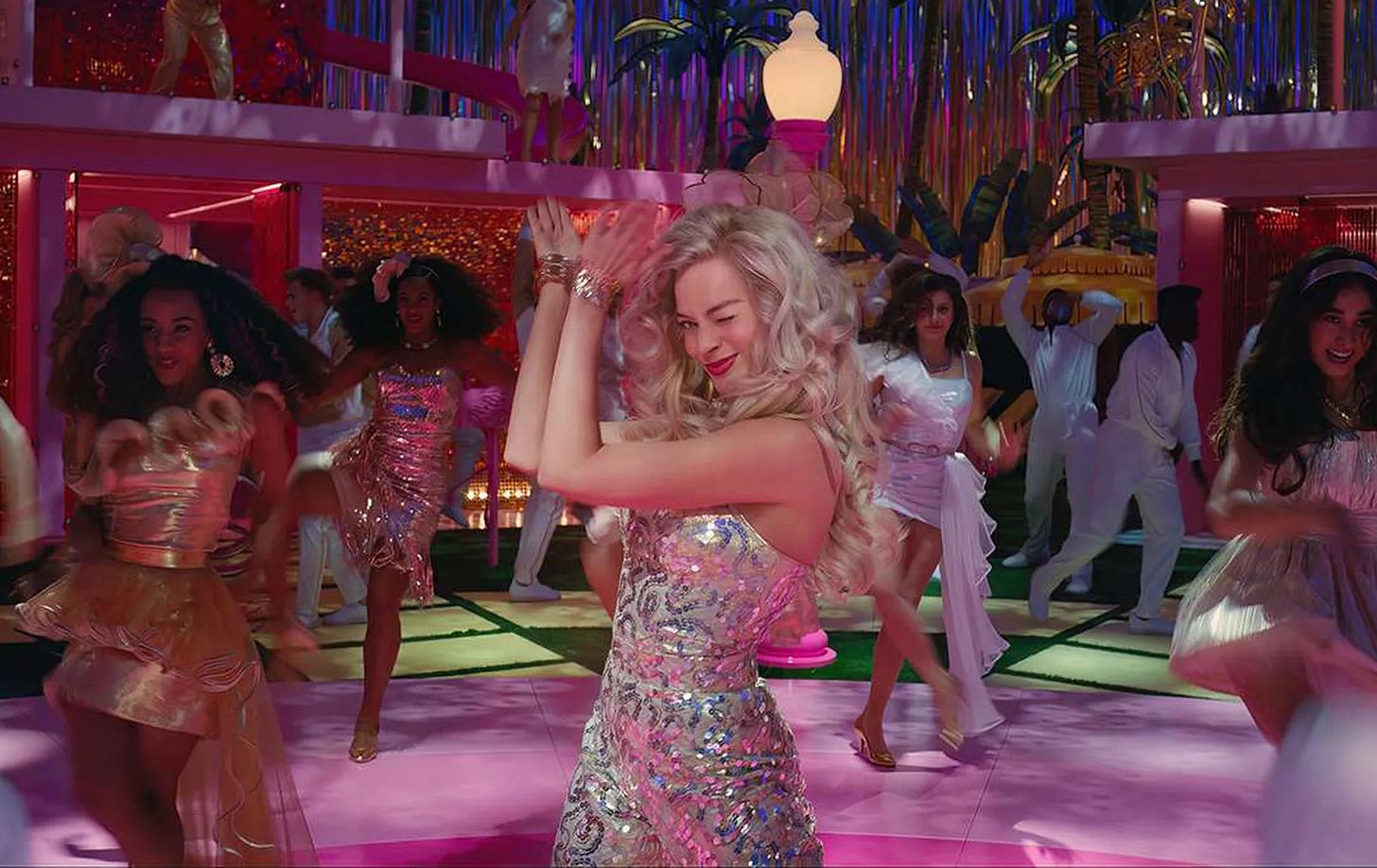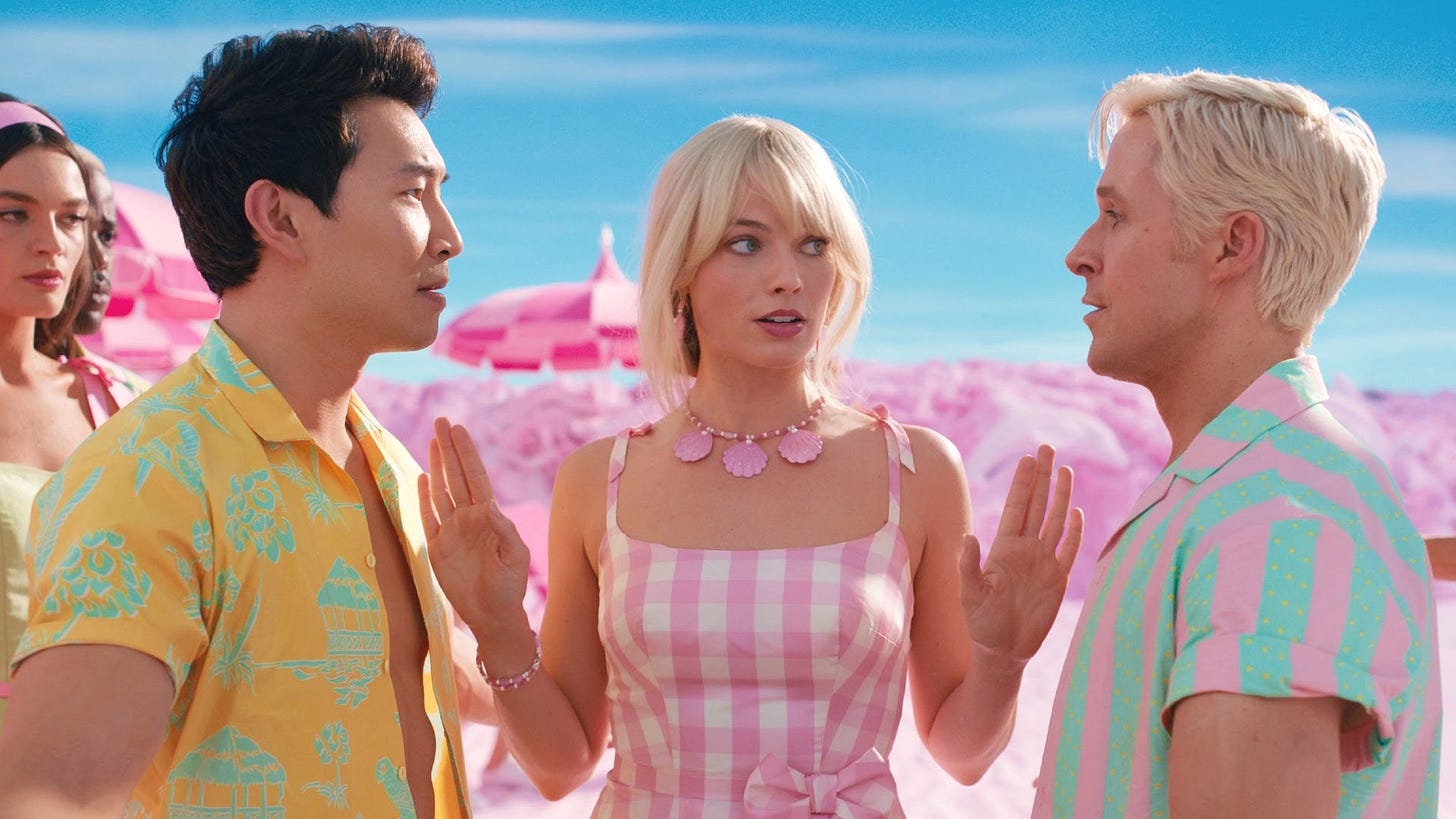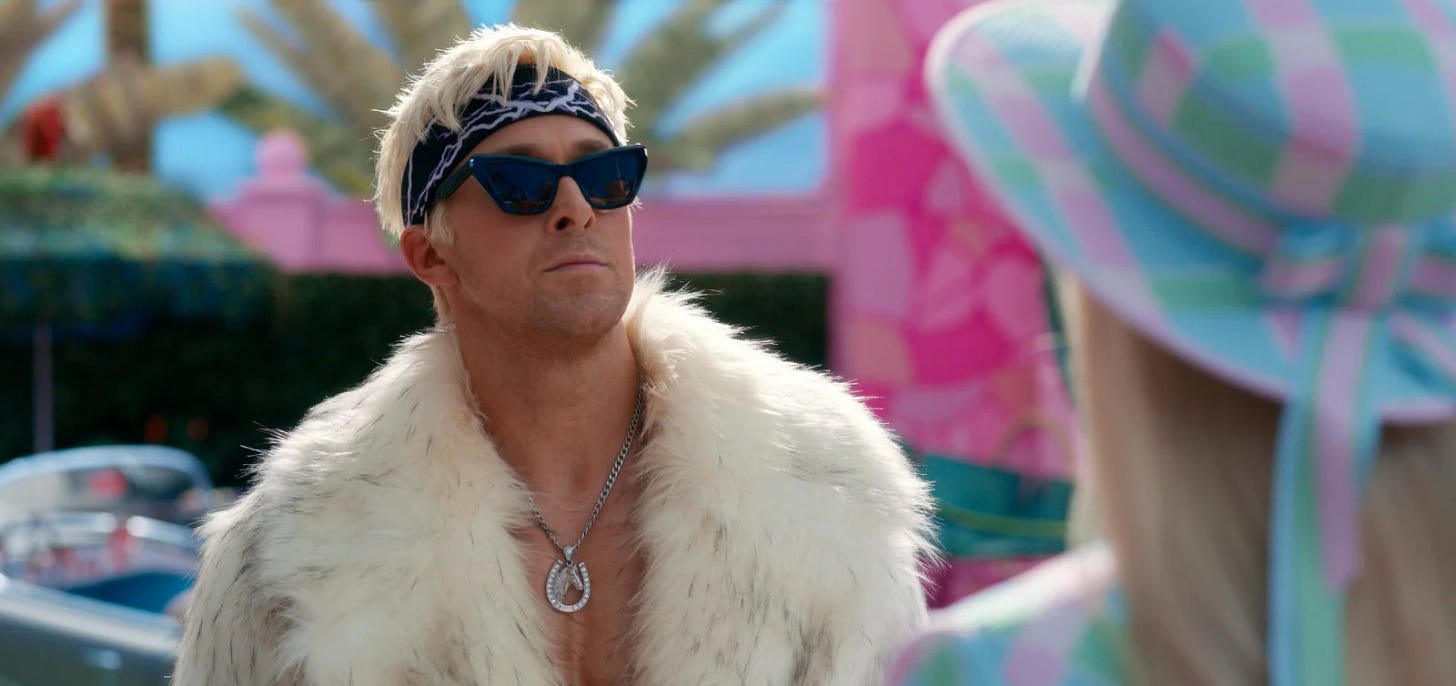Did 'Barbie' need Ken?
Thoughts on the structural lows and emotional highs of Greta Gerwig's Barbie movie
Welcome to Girl Culture, the newsletter where Caroline Siede examines pop culture, feminism, and all things girly. Learn more about Girl Culture’s mission here
[This article contains spoilers for the Barbie movie]
There’s a moment in Barbie that’s made me tear up both times I’ve seen it: America Ferrera’s Gloria pulls up Kyle Reese-style to rescue Margot Robbie’s Barbie from the clutches of Mattel. As the two women lock eyes for the first time, smiles of recognition spread across their faces — like some kind of deep longing unexpectedly fulfilled. It’s the sort of look usually reserved for lovers in a romantic comedy, but here it’s deployed in the name of female connection and girlhood nostalgia. It’s a moment that feels like both picking up a beloved life-long friend from the airport and bonding with a stranger at 2 a.m. in the women’s bathroom at a club.
If only the whole movie could’ve felt like that.
Following in the footsteps of Clueless, Legally Blonde, Mean Girls, and Pitch Perfect, Barbie has already emerged as a generation-defining girl comedy, one that’s smashing box office records, saving the theatrical experience, and probably causing a run on the color pink. (And it’s only been in theaters for two weeks!) Barbie is an ode to the power of bold, tangible cinematic aesthetics and a masterclass in tonal shifts as only Greta Gerwig can provide. It’s also two movies inelegantly stitched together with a bizarre runner starring Will Ferrell.
The first, and I would argue better, of the two movies is the one set-up by the first act. Robbie’s “Stereotypical Barbie” lives a picture-perfect life in Barbieland until one day she starts to malfunction as thoughts of death fill her head, cellulite covers her thighs, and the heels of her feet suddenly hit the ground. Kate McKinnon’s Weird Barbie explains there’s been a rip in the fabric that separates Barbieland from the real world, and the emotional struggles of the girl playing with Barbie have started to carry over to the doll herself. Barbie’s only hope of putting things right is to travel to the real world and find her human. As Weird Barbie puts it, “You gotta help her to help yourself.”
For a while, at least, that seems like it’s going to be the central drive of the film. Barbie’s quest first leads her to a cynical tween named Sasha (Ariana Greenblatt) before she realizes it’s actually Sasha’s lonely, unfulfilled mom Gloria who’s been giving her those pesky irrepressible thoughts of death. Barbie sets itself up as a fish-out-of-water comedy in which Barbie will help a mother and daughter reconnect while learning some lessons about the complications of the real world along the way. But while those things do (sort of) wind up happening, they end up playing second fiddle to a story about… Ken.
You can almost literally feel the moment the movie grinds to a halt as a second version of the script takes over. To evade the head honchos at Mattel, who want to put her back in a box (a threat that starts and stops out of nowhere), Barbie somewhat arbitrarily decides to bring Sasha and Gloria back to the matriarchal utopia of Barbieland. Once there, however, they discover Ryan Gosling’s Ken has unleashed the horrors of patriarchy on the plastic paradise. Suddenly the stakes of the film shift from a personal story about three women to a socio-political satire about gender roles. Gloria isn’t there to be saved by Barbie, she’s there to save Barbieland. And Barbie’s ultimate task isn’t to bring a mother and daughter together, it’s to reassure Ken that he’s enough.
While I’ve heard people complain that Barbie is a film with too many ideas, I think the bigger problem is that it doesn’t have a cohesive narrative spine to hang them all from. Barbie could’ve worked as either a wistful Toy Story-esque tale about girlhood and growing up or a Stepford Wives-esque satire about modern gender roles. But mashing the two storylines together winds up undercutting them both. The first act sets up Gloria for a self-actualization arc that the second act mostly handwaves away. And that means her big climactic monologue about the difficulties of being a woman winds up rooted in generalized concepts more than anything we’ve actually seen her grapple with onscreen.
Ken, meanwhile, is set up to be a scene-stealing supporting player (think James Marsden in Enchanted) only to suddenly become the film’s main antagonist. And though Gosling and the rest of the Kens are funny enough to pull off the heel turn, the shift happens so late into the film that there’s not quite enough time to explore the layers of satire Gerwig is working with here. On the one hand, the Kens offer a mirror universe exploration of how women are treated in the real world, with all the pressures, rivalries, and insecurities that oppression creates. On the other hand, they’re also just a straight send-up of fragile, toxic masculinity — Mojo Dojo Casa Houses and all.
It’s a lot, especially when the third act makes room for not one but two Ken-centric musical numbers. In fact, compared to satirical girl comedies like Gentlemen Prefer Blondes, Bring It On, and Josie and the Pussycats, Barbie is an anomaly in just how much it cares about its male characters, and I’m curious where that impulse comes from. Gerwig has spoken earnestly about wanting Barbie to resonate with men as much as women, and her choice to write the screenplay with her personal and professional partner Noah Baumbach certainly reflects that desire. But I could also easily imagine Warner Bros. requesting a beefed-up role for Gosling in order to broaden the film’s four quadrant appeal. (Similarly, for all the praise I’ve seen for Mattel’s willingness to poke fun at itself, nothing feels more like a C-suite note to me than “get Will Ferrell to make fun of me.”)
Regardless, it’s a little jarring to end the Barbie movie with a scene where Barbie apologizes to the man who overthrew her society and brainwashed her friends — even if it’s part of a worthy message about giving men space to process their feelings.
To be fair, the film’s laugh-out-loud comedy helps smooth over some of the plot wonkiness. And it's a testament to how weird and wild and funny Barbie is that it still mostly manages to work, despite its bifurcated script. Especially on a second viewing, I found it easier to let go of my expectations for what a Barbie movie could be and appreciate the strange, wonderful film Gerwig got away with making. All blockbuster filmmaking these days is an act of negotiation. And if the trade-off for something like Ferrell’s unnecessary inclusion is the wonderful scene where Barbie compliments an older woman’s beauty, it was probably worth it.
Indeed, what sparkles brightest in Barbie aren’t the dazzling costumes or even the pitch-perfect performances, it’s the layer of existentialism Gerwig manages to sneak into the film: The catharsis Barbie feels at crying for the first time; that hilarious Depression Barbie commercial; the quietly heartbreaking shot late in the film where Barbie looks around with bittersweet joy before joining her friends in their celebratory dance party.
More so than Barbie’s jokes about patriarchy or its big feminist speeches, it’s the duality of the film’s tone that represents womanhood and girl culture to me. The way the fizzy fun of dressing up exists alongside the “undertone of violence” of catcalls. The image of Barbie recounting the components of fascism while wearing a hot pink bell-bottomed cowboy outfit. The idea that something can be deeply sad and deeply empowering all at once.
If Barbie’s friendship with Gloria winds up frustratingly underserved after its great intro, Gerwig at least finds the film’s heart in another female relationship: Barbie’s unexpected bond with her creator Ruth Handler (Rhea Perlman), a ghost who keeps an office on Mattel’s seventeenth floor. There’s a Biblical element to Barbie’s story of paradise lost, and in Ruth, Gerwig presents a gorgeously empathetic version of God. For most if its runtime, Barbie bounces back and forth between the questions “What do Barbie dolls mean on a personal level?” and “What do Barbie dolls mean on a societal one?” But the finale ultimately pivots to a different kind of question altogether: “What does it mean to be human?”
In a plastic world where everything is perfect and life has no end, there’s nothing to compare the highs to — no lows to make them meaningful. Barbieland is a place brimming with intelligence but lacking in interiority. And what Barbie realizes along her strange, winding quest is that once you’ve discovered a sense of inner life, you can’t go back to ignoring it. Like Frodo returning to the Shire, she can no longer stay in a place that never changes because she herself has been changed by her journey. As Billie Eilish sings in her haunting ballad “What Was I Made For?”: “I don’t know how to feel / But I wanna try.”
In the end, Barbie realizes she doesn’t need Ken, or anyone for that matter, to make her whole. Nor does she need permission to be who she wants to be. It’s a lesson I wish the Barbie movie had taken to heart a bit more. But it’s also a lesson I can appreciate was put into a tentpole blockbuster at all. Barbie isn’t as streamlined as my favorite girl comedies, but it’s more thematically ambitious than many of them too. And I’ll take flawed ambition over plastic perfection any day of the week.
Next time on Girl Culture: Generations collide in the final season of High School Musical: The Musical: The Series











I love and appreciate your review! ❤️ Although, I see Ken as representing a woman in the first and last thirds of the film - so that final scene is more like Barbie as a man apologising to and building up women! 😁